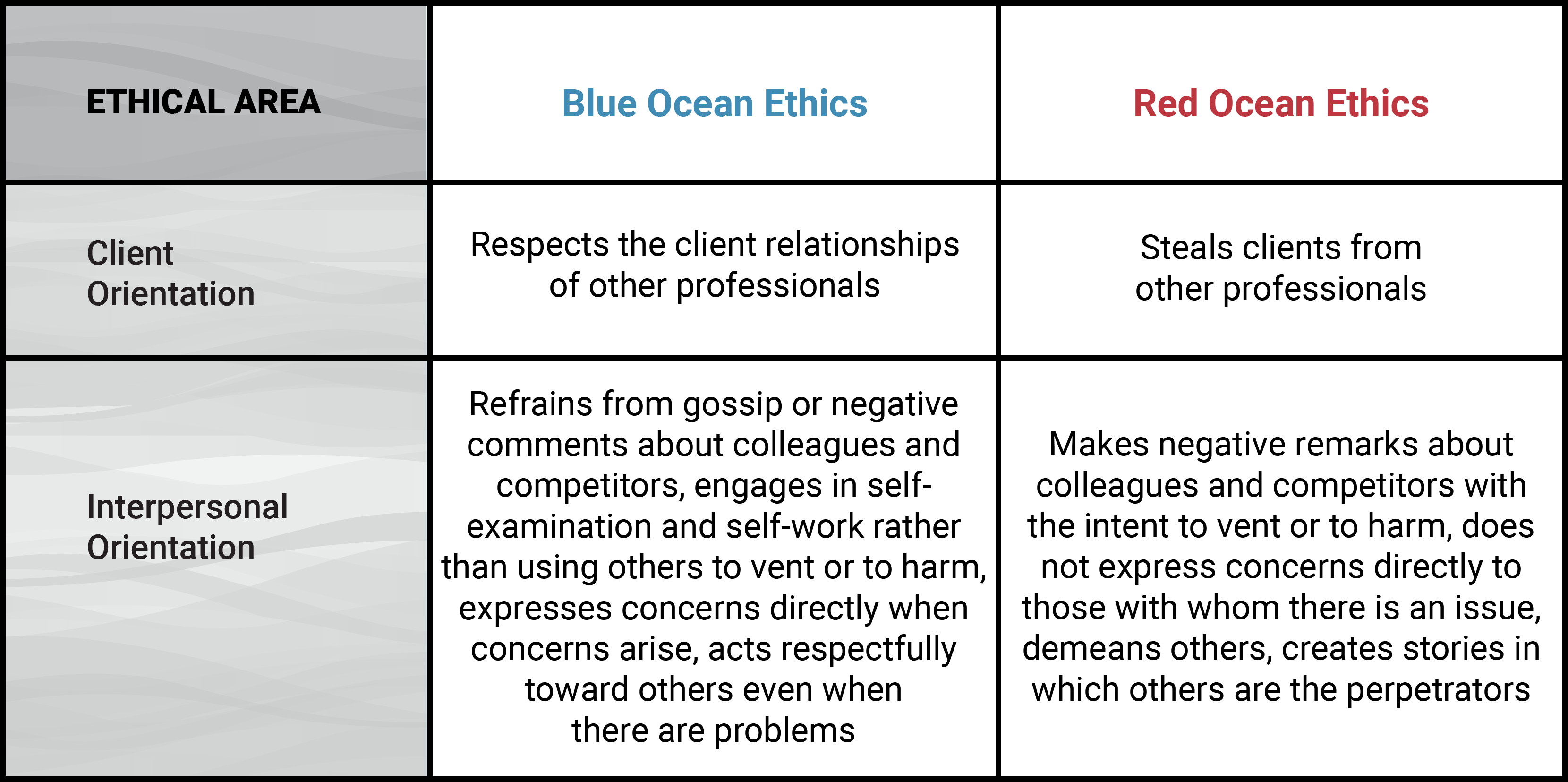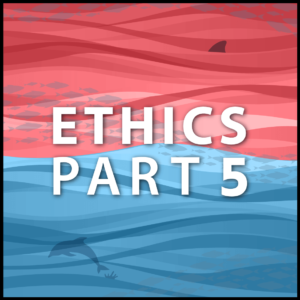An Enneagram in Business (EIBN) requirement is that all network members adhere to Blue Ocean ethics in order to maintain integrity and build trust among one another and with clients. These ethical guidelines, which I created, include the accurate representation of background and services; respect for intellectual property; open information and idea sharing; fair pricing; honoring agreements; an abundance rather than scarcity orientation; and respect for clients, collaborators and competitors.
Red Ocean Ethics: Individuals who use Red Ocean guidelines beat the competition using existing rules of competition and trading off between diversification (differentiation) of products, services, and cost.
Blue Ocean Ethics: Individuals who use Blue Ocean guidelines leverage untapped market space, expand existing industry boundaries, and/or move outside existing industry boundaries.
The translation of Blue Ocean guidelines from organizational use to individual practice has 10 areas; this blog reviews the remaining two areas of the 10, with earlier blogs having covered eight topics. Thus far, values related to professional self-presentation, intellectual property, sharing of information, competitive orientation, pricing and financial values, and strategic and psychological orientation have all been described. Now, the focus is client and interpersonal orientation.

Client Orientation
Client orientation is a subtle area when it comes to differentiating between the Blue Ocean and the Red Ocean. Why? Because Enneagram professionals, Blue or Red, would likely say they respect their clients, but this is more about the client relationship than client respect. In the Red Ocean, clients are vehicles by which trainers, coaches and consultants make money, leverage their professional life for other work, gain status by the name of the company or level of the client, and think nothing – or very little – about going after clients of other Enneagram professionals in a variety of ways. One way that is particularly destructive is by directly or indirectly denigrating the other professional to potential clients. As an example, a close colleague of mine was in an informal gathering where my name came up in a positive way from someone who was considering attending one of my programs. An Enneagram teacher who was present said, ”Oh, she’s not a very good teacher. She doesn’t know how to teach.” In dismay, my close colleague said, “She’s one of the best; she’s adept at teaching through experience rather than only lecture.”
In another case of Red Ocean, I referred a major and long-term client of mine to a close friend/colleague because the client needed some work on a specific date, and I was already booked. With the referral, I made it very clear to my colleague that this was an event-specific substitution, not a comprehensive referral for all other work. All seemed fine, until a few months later, I found out from the client informally that the person to whom I had referred the work was soliciting my client for more work. When I phoned the colleague, their response was, “Oh, I didn’t think what I did applied to taking your client since I didn’t think you wanted to do the kind of work I was soliciting.” There was no apology, no understanding. The saddest part for me was that I thought this colleague was Blue Ocean, but that was not the case.
In the Blue Ocean, there is no need to steal clients from other professionals for two reasons: (1) you have enough clients yourself already or know that you need to create your own, and (2) you would never steal someone else’s client because you would not want that done to you. Of course, being clear and clean about whether you behave in Red or Blue Ocean requires self-honesty about your real motivation combined with a big dose of integrity.
Interpersonal Orientation
The issues of client orientation and interpersonal orientation are interwoven in the Enneagram world because there is an Enneagram community made up of multiple communities. In other words, we all, to some extent, know, will know, or could know each other. In the general consulting, training and coaching world, this is not always the case. Enneagram communities intersect.
To explain the interpersonal aspects of Red versus Blue Ocean, I repeat the descriptions, just for easy reference.
Red Ocean
Makes negative remarks about colleagues and competitors with the intent to vent or to harm, does not express concerns directly to those with whom there is an issue, demeans others, creates stories in which others are the perpetrators
Blue Ocean
Refrains from gossip or negative comments about colleagues and competitors, engages in self-examination and self-work rather than using others to vent or to harm, expresses concerns directly when concerns arise, acts respectfully toward others even when there are problems
I have heard, in too many public presentations, Enneagram presenters degrade other Enneagram teachers or their concepts, and I find it nasty and unnecessary. Recently, I heard an Enneagram teacher publicly degrade an entire school and do so in an angry, authoritative tone. It was stunning and harmful. In addition, the session was being taped, so the message wasn’t just given to those in the room. The presenter said something like this: “Yes, I am angry about this way of using the Enneagram and so should you.” The presenter thought this was an honest statement. Honest for this person, perhaps, but honest in a Red Ocean way. In the Blue Ocean, this would not be said; it might not even be thought or if thought, not be experienced with such a degree of hostility. How I received it was that the presenter was being competitive, highly judging, and had anger issues that had not been resolved.
Blue Ocean Summary
We have a lot of work to do in the Enneagram community. We may not agree with each other. We may not even like each other. But we can still be in community in a Blue Ocean way. A Red Ocean Enneagram community really isn’t a higher consciousness way of engaging. And I do have hope for this transformation.
Ginger Lapid-Bogda PhD, the author of seven Enneagram-business books, is a speaker, consultant, trainer, and coach. She provides certification programs and training tools for business professionals around the world who want to bring the Enneagram into organizations with high-impact business applications, and is past-president of the International Enneagram Association. Visit: TheEnneagramInBusiness.com | ginger@theenneagraminbusiness.com

Ginger, Thank you for producing this series on Blue Ocean Ethics. It is so uplifting to have the principles of good coaching and authentic relationships in business stated clearly and without compromise. I admire your fearless ability to state the truth in Blue Ocean Ethics. It’s very reassuring for me that you are getting these messages out to such a large group of people. Thank you!
Mary Amohanga